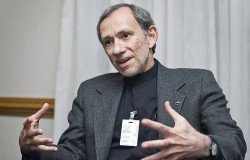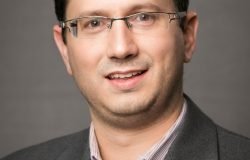Prof. Konstantinos Drosatos. Founding member of HBA-USA and president of the HBA for more than 4 years.
The HBA would like to kick off the new section of the site with the republishing of an interview of Dr. K. Drosatos who is a founding member of the HBA, has been with HBA since its inception and has been supporting the Association in all its steps. The interview was first published in the Greek-American publication “Cosmopolis” in December 2010 (Vol. 2, No. 1). Since then we did some edits to reflect the current achievements and direction of HBA.
Dr. Drosatos is currently an Assistant Professor in Pharmacology & Center for Translational Medicine at Temple University. His research aims to elucidate the mechanisms that underlie sepsis-induced cardiac energy deprivation and coordinate with clinical scientists to propose potential treatments for improvement of heart function in septic patients. The findings of his studies can be extrapolated to other types of cardiac dysfunction and propose novel therapies for the treatment of heart failure (HF). In addition, we are exploring the cardiac metabolic profile and its contribution in the phenotype of other diseases, such as the Spinal Muscular Atrophy (SMA).
When was the Association founded and how many members does it currently have?
The Hellenic Bioscientific Association in the USA (HBA-USA–www hba-usa org) was an idea that I shared with a few friends in January of 2005 and along with others we formed a temporary Board that initiated an informal network of communication among Bioscientists who live and work in the United States In a couple of months it became apparent that a significant scientific potential exists within the Greek-American Bioscientific community. This fact, along with the willingness of the U S -based Greek Bioscientists to interact with each other on scientific basis, as well as to contribute in the improvement of the quality of research and education in Greece led us to upgrade the network and register it as a non-profit tax-exempt scientific association. The headquarters of the HBA-USA is in Boston. However, Bioscientists from across the country can register This has resulted i n a membership that has exceeded the number of 300 Bioscientists from 32 states 50% of the Bioscientists who have registered with the HBAUSA are of Assistant Professor’s level and above, approximately 45% are post-doctoral researchers and 5% are graduate students
What were the aims and goals behind the creation of the Association?
Since the very initial steps of the HBA-USA, that I have been honored to serve as the President for 5 years, the major aim was to facilitate the interaction among Greek Bioscientists in the US and abroad. This scope has been substantiated by multiple activities. All these activities aim:
- To improve the professional and scientific networking of the Greek Bioscientists with each other and also with other scientific networks in the US and abroad.
- Get in proximity senior and young researchers of Greek origin in the USA to facilitate scientific ideas and professional information exchange.
- To establish collaborative programs with research institutes and universities in Greece.
Which goals and aims of the Association have already been accomplished?
I don’t think that any of the essential aims that led to the formation of this scientific network will ever reach what you name “accomplishment” and in my point of view this should never happen Nevertheless, as a Biologist, I believe that teleonomy is an everlasting process that feeds in sustainable development and viability. When a plan is accomplished, then a more significant one needs to be set and followed by intensive team-work until execution. In regards of specific activities that serve the purpose of the association’s generation and have accomplished up to date I would pick the following:
- Establishment of a permanent and interactive communication channel among the Bioscientists in the USA, via our webpage and the quarterly newsletter.
- Information flow about positions that are available in the USA and abroad.
- Scientific symposia and conferences.
In October of 2009 the HBA-USA organized, under the auspices of the Consulate General of Boston, a Pan-American scientific conference that attracted approximately 100 scientists from 13 states and hosted top notch scientific sessions Last year the HBA-USA organized in New York a symposium about research funding and professional opportunities in the US and the European Union In 2008 and 2009 the HBA-USA contributed in the organization of the scientific part of two world scientific conferences that the Ministries of Health in Greece and Cyprus put together In 2006 I personally represented the HBA-USA as a member of the organizing committee of the conference “Biosciences in the 21st century” that was coordinated by the Hellenic Union of Bioscientists.
Believing in the importance of the personal aspect for the establishment of scientific collaborations we have organized local social events in Boston, New York, Philadelphia, Chicago, Los Angeles and Baltimore.
Establishment of a student research training program. This program is already active and there are positions that can occupy prominent college graduates from the US and Greece who plan to continue their studies in graduate programs of American universities and want to improve their research skills Besides, Graduate students Greek universities are welcome to participate in this program and do a part or the entire research project for their PhD thesis in a lab of the professors that kindly provide such opportunity.
Establishment of mutual agreements for educational collaboration with the School of Biology of the Aristotle University of Thessaloniki and the Department of Biological Applications and Biotechnology of the University of Ioannina. These departments have agreed to host faculty members that have registered with our society and are willing to travel in Greece and participate in graduate and undergraduate teaching for a period of 1-2 weeks.
Collaboration with the Patras Sciences Park for the development of a professional scientific database of the Greek scientists.
Collaboration with the Office of Education of the Greek Orthodox Archdiocese of America for summer research internships for excellent students of the Greek schools that operate un-der the auspices of the Archdiocese. Our webpage at www.hba-usa.org is the most appropriate source to be informed about our activities on a more detailed basis.
How do you plan on promoting your work and who are your prospective members?
Undoubtedly, a core of major activities has been launched in the past 5 years and has delineated the broad range of the aims that the HBA-USA can work for. The new Board of Directors that will be elected on January 17, 2010 will need to upgrade the quality and effectiveness of these activities, as well as to intensify fundraising to enhance the scientific significance of the HBA-USA’s activities.
Of similar importance is the expansion of the membership. Since the members of the Board of the HBA-USA do not intend by any way to represent the Bioscientists who register with this network but to coordinate the individual efforts and initiatives that were undertaken by Bioscientists of Greek origin, the expansion of the membership will bring in more Bioscientists that share the intention to contribute in the aims of the society.
One of the most ambitious goals that have been set is to make the HBA-USA able to fund research projects and contribute in the advancement of the Greek-American and the Greek scientific community. The maturation of the association and its engagement in scientific collaborative projects are prerequisites that can substantiate the basis for the development of such important activity.
Have you collaborated with other institutions whose goals are similar to yours so you could facilitate and promote your work together?
The interaction of the HBA-USA with other societies of relevant interests in the USA and abroad has been among the top priorities of our network since its existence. This intention was reflected by the invitations that were extended to the Hellenic Medical Society of New York, the New England Hellenic Medical and Dental Society and the Federation of Hellenic American Societies of North America for participation in the Multidisciplinary Workshop in Biomedical Sciences that was held in Boston on October 10-11.
Since 2007 the HBA-USA is officially registered and is represented in the executive board of the World Hellenic Biomedical Association (WHBA). The WHBA is a scientific network that has launched its activities more than 25 years ago and is supported by numerous Greek members of the academic community worldwidely. I was honored to be recently elected as the President-elect of the WHBA which means that I will serve as the president of this association in 2012 and 2013 following the term of the current President, Dr. George Tsioulias, who is the President of the New York Hellenic Medical Society as well.
Besides, the HBA-USA is a member of the Global Hellenic Medical & Biosciences Network that is managed by Dr. Spyros Mezitis. This is a communicative umbrella of Hellenic medical and bioscientific societies from around the world that was initiated by the former minister of Health of Greece, Mr. Dimitris Avramopoulos 3 years ago with the aim to support the health care system in Greece. In the context of the participation of the HBA-USA in the GHMBN, we contributed in the organization of two scientific meetings that were staged in Paphos, Cyprus and Lagonissi, Greece in 2008 and 2009 respectively and were funded by the Greek and Cypriot Ministries of Health.
Finally, the HBA-USA has established permanent communication channels with the Hellenic Medical Societies of New York and Boston, the Hellenic Business Network that is now expanding its activities in the entire USA, the Federation of Hellenic Medical Societies of North America, the Patras Science Park, the European Institute for Law, Science and Technology, the Hellenic Union of Bioscientists, the Hellenic Medical Students International Committee as well as with research institutes and all medical and bioscientific departments of universities in Greece.
Are there social events held by the Association for non-members to attend?
The next important activity of the HBA-USA is the Election of the Board of Directors that will serve for the next two years. The new Board will define the calendar of social activities for the upcoming period
How can one become a member or contribute to your Association?
In order to register with the HBA-USA as a full member someone needs to fulfill the following criteria:
- Current occupation related to Biosciences.
- Greek or Cypriot origin or descent.
- Physical presence in the USA.
- Active involvement in research.
Besides, people who do not meet these criteria but are eager to support the activities of the HBA-USA can register as associated members. Registration can be submitted online via our webpage. Someone can contribute in our activities either as a full member, volunteer or sponsor. However, one of the most important services that someone can offer to our society is to spread the word about the HBA-USA to Bioscientists so that they join the network and contribute with participation in the ongoing activities and ideas about new endeavors that the association should invest in.
Before I close, please allow me to extend my sincere appreciation to all professors and exceptional researchers that have joined the advisory board of the HBA-USA and have guided us on the proper organization of our activities.
Last but not least I would like to thank wholeheartedly all members of the current and previous boards of directors, Dr. Thomas Thomou (Mayo Clinic), Ms. Magdalene Vasiadi (TUFTS), Dr. Dimitris Iliopoulos (Harvard), Dr. Iordanes Karagiannides (UCLA), Dr. Evangelos Ntrivalas (RFUMS Chicago), Dr. Dionyssis Gousetis (Northwestern University), Dr. Kyriakos Kypreos (Boston Univ, currently in the Univ of Patras), Ms Emma Filippidi (NYU), Dr. Kyriaki Bakirtzi (UCLA) and Dr. Ioannis Gryllos (Harvard).




